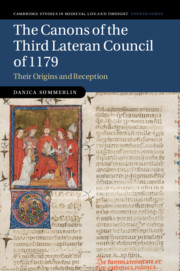
-
Select format
-
- Publisher:
- Cambridge University Press
- Publication date:
- November 2019
- November 2019
- ISBN:
- 9781316536209
- 9781107145825
- 9781108813846
- Dimensions:
- (228 x 152 mm)
- Weight & Pages:
- 0.59kg, 310 Pages
- Dimensions:
- (229 x 152 mm)
- Weight & Pages:
- 0.471kg, 332 Pages
You may already have access via personal or institutional login
Book description
Alexander III's 1179 Lateran Council, was, for medieval contemporaries, the first of the great papal councils of the central Middle Ages. Gathered to demonstrate the renewed unity of the Latin Church, it brought together hundreds of bishops and other ecclesiastical dignitaries to discuss and debate the laws and problems that faced that church. In this evaluation of the 1179 conciliar decrees, Danica Summerlin demonstrates how these decrees, often characterised as widespread and effective ecclesiastical legislation, emerged from local disputes which were then subjected to a period of sifting and gradual integration into the local and scholarly consciousness, in exactly the same way as other contemporary legal texts. Rather than papal mandates that were automatically observed as a result of their inherent papal authority, therefore, Summerlin reveals how conciliar decrees should be viewed as representative of contemporary discussions between the papacy, their representatives and local bishops, clerics, and scholars.
Reviews
‘Undergraduate and graduate students interested in the impact of canon law should profit greatly from this work, as should those interested in dialogues between sacred and secular, theology and canon law, and the papacy and regional churches.’
Jessalynn Lea Bird Source: Speculum: A Journal of Medieval Studies
'Summerlin uses manuscript evidence intelligently, shining a strong scholarly torch on dark places in the thickets of textual and manuscript data provided by earlier scholars in highly technical studies. She is at home in the major scholarly languages, notably German, so crucial in this field. Her laborious and skilful work makes for a dense text, but there are clear conclusions to each chapter. Her findings are striking and, to this reviewer, convincing.'
David d'Avray Source: Journal Of Ecclesiastical History
Contents
Metrics
Altmetric attention score
Full text views
Full text views help Loading metrics...
Loading metrics...
* Views captured on Cambridge Core between #date#. This data will be updated every 24 hours.
Usage data cannot currently be displayed.
Accessibility standard: Unknown
Why this information is here
This section outlines the accessibility features of this content - including support for screen readers, full keyboard navigation and high-contrast display options. This may not be relevant for you.
Accessibility Information
Accessibility compliance for the PDF of this book is currently unknown and may be updated in the future.


